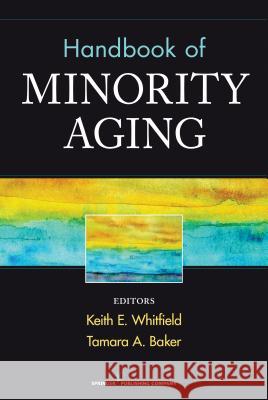Handbook of Minority Aging » książka
Handbook of Minority Aging
ISBN-13: 9780826109637 / Angielski / Miękka / 2013 / 592 str.
The array of topics covered is amazing, making this book a valuable, significant resource for many disciplines...This multidisciplinary review of the literature on minority aging presents the scholarship related to public health and 'social, behavioral, and biological concerns' of aged minorities like no other publication. Graduate students will certainly be well-served by this book, as would faculty teaching aging at both undergraduate and graduate levels...Highly recommended."--Choice: Current Reviews for Academic Libraries √nwhile practitioners of gerontology, family medicine, and any professional involved in the care of the elderly will find some practical guidance in the second part of the book, it will really earn a place on the bookshelf of anyone and everyone with an interest in US sociology and the development of public policy for the elderly. With the general aging of the population and the book's accentuation of current issues, this outstanding review will become an indispensable tool.Healthy Aging Research This text provides up-to-date, multidisciplinary, and comprehensive information about aging among diverse racial and ethnic populations in the United States. It is the only book to focus on paramount public health issues as they relate to older minority Americans, and addresses social, behavioral, and biological concerns for this population. The text distills the most important advances in the science of minority aging and incorporates the evidence of scholars in gerontology, anthropology, psychology, public health, sociology, social work, biology, medicine, and nursing. Additionally, the book incorporates the work of both established and emerging scholars to provide the broadest possible knowledge base on the needs of and concerns for this rapidly growing population. Chapters focus on subject areas that are recognized as being critical in understanding the well being of minority elders. These include sociology (Medicare, SES, work and retirement, social networks, context/neighborhood, ethnography, gender, demographics), psychology (cognition, stress, mental health, personality, sexuality, religion, neuroscience, discrimination), medicine/nursing/public health (mortality and morbidity, disability, health disparities, long-term care, genetics, dietary issues, health interventions, physical functioning), social work (caregiving, housing, social services, end-of-life care), and many other topics. The book focuses on the needs of four major ethnic groups: Asian/Pacific Islander, Hispanic/Latino, African American, and Native American. Key Features:
- Provides current, comprehensive information about minority aging through a multidisciplinary lens
- Integrates information from scholars in gerontology, anthropology, psychology, public health, sociology, social work, biology, medicine, and nursing
- Emphasizes the principal public health issues concerning minority elders
- Offers "one-stop shopping" regarding the development of a substantial knowledge base about minority aging
- Includes recent progressive research pertaining to the social, cultural, psychological and health needs of elderly minority adults in the US











